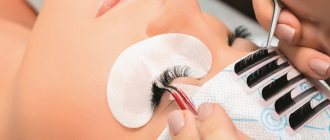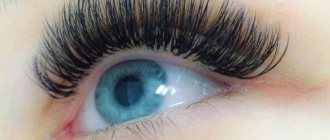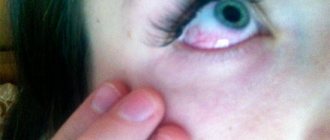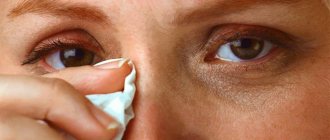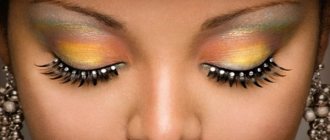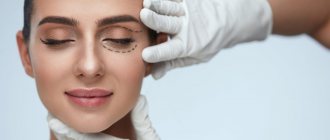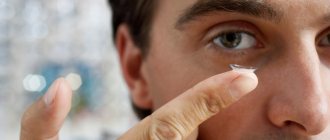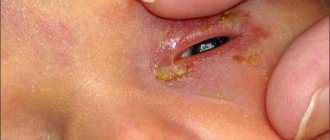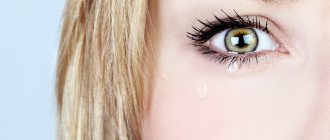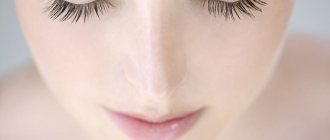Eyelashes itch at the base after extensions
Often clients do not know what to do if their eyes itch and itch after eyelash extensions. Often this phenomenon is associated with increased sensitivity of the body to the material used. The symptom is accompanied by swelling of the mucous membrane and burning, the appearance of redness.
Allergies are often caused by the adhesive with coloring pigments used. What symptoms occur with allergies:
- Feeling of irritation and burning;
- lacrimation;
- Redness of the whites of the eye;
- Swelling and redness of the eyelids.
There are other symptoms of hypersensitivity - sneezing, tingling sensation in the nose and throat, secretion from the nose, swelling of the mucous membrane. The phenomenon can be relieved with the help of allergy medications. They should be taken only after the recommendation of a specialist. Traditional methods of treatment should not be used. If allergy symptoms are severe, you should consult a doctor immediately.
To eliminate the manifestation of a long-term allergic reaction, you may need to remove hairs with a hair remover from a professional. It is not recommended to remove eyelashes yourself, as there is a risk of damaging your own hairs.
Another reason why itching appears after extensions is infection during manipulation. This can happen if the master did not follow the rules for processing tools.
Irritation and burning occur if the eye is injured during the process of fixing the fiber. Sometimes itching is associated with the use of low-quality materials or incorrect fastening. To avoid such complications, you need to carefully choose a specialist.
Causes of illness and accompanying symptoms
Why do women sometimes have sore eyes after eyelash extensions? There are several reasons, and the accompanying symptoms will depend on them. Consequently, only after clarifying what exactly provoked the malaise can the unpleasant symptoms be removed. Let us dwell on the reasons why the eyes sting after an eyelash extension procedure in more detail.
Allergic reaction
Most often, women are allergic to the glue used for artificial eyelash extensions. This element comes in 2 types:
- black,
- colorless.
It is the first one that most often causes unpleasant symptoms. Black glue contains a coloring pigment to which a woman may be hypersensitive.
How does an allergy to eyelash extensions manifest? The main symptoms include:
- itching and burning of the mucous membranes of the eyes,
- lacrimation,
- hyperemia of the eye whites,
- swelling of the eyelids.
Remarkable. If the reason why eyelashes itch after extensions is an allergy, then there will be a lack of pain in the swollen area. Of course, this does not apply to situations where a woman has rubbed her eyes until microcracks and wounds form.
Some representatives of the fairer sex who complain that after the eyelash extension procedure their eyelids are very swollen may experience other allergic manifestations in the form of:
- sneezing,
- itching in the nose,
- active secretion of nasal secretions,
- swelling and hyperemia of the nasal mucosa.
Allergic swelling resulting from eyelash extension procedures can be removed with the help of antihistamines, eye drops and alternative medicine recipes.
Accession of infection
The addition of a bacterial or fungal infection is possible when:
- neglect by the master of sterility conditions during the procedure,
- failure by the client to comply with the rules of hygiene or care for eyelash extensions in the first days after the procedure.
Another complication is conjunctivitis after eyelash extensions. With it, the same clinical manifestations are observed as with allergies, but only the entire eye swells up, becomes hyperemic, and hurts intensely.
A characteristic symptom of bacterial conjunctivitis is the flow of pus from the eyes. The eyelids stick together so that it is impossible to open them.
The disease does not develop at lightning speed - it takes time. Therefore, do not hesitate to visit a doctor if your eyes are watery after eyelash extensions. Lack of treatment can have serious consequences, especially when it comes to infectious and inflammatory damage to the visual organ.
Injury
The work of an incompetent master can result in eye injury for a woman. Therefore, if the eyelid itches very much, the eye hurts and is swollen. And in parallel with this, vision is impaired or the mobility of the visual organ has decreased, this may mean that during the procedure the mucous membrane, eyelid or retina was damaged by the instrument. If you have such disturbances in the activity of the eye, you should not hesitate to visit a doctor - such mistakes by the doctor can result in extremely serious and serious consequences for health.
Other reasons
Other reasons why women’s eyelashes itch at the base after extensions are:
- low quality of materials used (and this applies not only to the glue, but also to the eyelashes themselves),
- rejection by the body of a foreign element, which are eyelash extensions. This is an immune reaction of the body, the possibility of which must be taken into account by both the master and the client.
What to do when your eyes itch after eyelash extensions depends entirely on the cause of this deviation. There are situations when you can cope with a problem on your own, but there are also circumstances when the lack of intervention from a doctor can have serious consequences.
Causes of itching of the eyelids near the eyelashes
There are several reasons why eyelashes itch. The occurrence of itching is associated with various factors. To identify why your eyelid itches, it is best to consult an ophthalmologist. This symptom is not always associated with extensions.
The main cause of unpleasant symptoms is allergies. In some cases, itching may be accompanied by the release of tears and a runny nose and cough. Flowering plants, dust, some foods and cosmetics cause this reaction.
The appearance of a tingling sensation at the root can be caused by conjunctivitis - this is an inflammation of the membrane of the eye, which is usually caused by fungi and bacteria. Blepharitis is characterized by thickening of the eyelid and the appearance of peeling and severe itching. A disease such as demodicosis can lead to itching.
Why do allergies to eyelash extensions occur?
During the cosmetic procedure, hypoallergenic components are used. Artificial eyelashes, degreasing agent, primers and other elements of manipulation in very rare cases cause individual intolerance. However, the glue for attaching the cilia and its evaporation can be allergens.
Factors that increase the likelihood of unpleasant symptoms:
- Use of resin-containing glue (used for high levels of masking, but rarely due to high toxicity);
- Individual intolerance to the components of the glue (in case of allergies, you will have to carefully analyze the composition, since each component of the product can be an allergen);
- Content of toxic substances due to the expiration date of the product;
- Poor quality components used for the adhesive mask;
- Incorrect actions of the cosmetologist performing the manipulation.
A separate group consists of girls who initially have a predisposition to sensitization. They are not recommended to undergo the procedure, regardless of what substances cause a reaction in them1.
Which doctor should I contact and how is diagnosis done?
If your eyelashes itch at the base of your eyelid, you should consult an ophthalmologist. If allergy symptoms appear after eyelash extensions, it is recommended to visit a therapist or allergist.
You will need to describe in detail the unpleasant sensations experienced - this could be pain in the eyes, increased tear secretion, sneezing, swelling of the eyelids, etc. On the recommendation of a specialist, you will need to remove the extended fiber using a special remover.
In some situations, drug therapy may be necessary. It is possible to prescribe medications for allergies, antibacterial agents, and drops to relieve irritation. Before the extension procedure, it is recommended to pay attention to what glue the artist uses, whether the composition is safe, and whether it emits toxic fumes.
Treatment of an allergic reaction to extensions
Effective treatment of an allergic reaction to eyelash extensions begins with visiting a specialist and having them removed. Sometimes cosmetologists advise trying to drink an antihistamine and wait for the result. If the clinic disappears, then the eyelashes may not be removed. This approach is incorrect, since the severity of symptoms and the worsening of the reaction directly depend on the duration of contact with the allergen.
When the first signs of an allergy appear, it is recommended to take a proven antihistamine. Second-generation drugs, which include Cetrin, act within 20 minutes after administration4. Additional recommendations:
- Refusal to use cosmetics for 1-2 weeks;
- Refusal of cosmetics for washing (you should clean your face with clean water);
- It is not recommended to rub your eyes or use untested drops;
- To relieve symptoms, you can apply chamomile compresses to your eyelids (it is hypoallergenic).
The duration of recovery depends on the severity of the allergic reaction. In some cases, a single dose of medication is sufficient, and sometimes you have to take a week-long course until the unpleasant symptoms stop bothering you4.
Preventing allergic reactions in the eyes
Every cosmetic procedure carries a risk of an allergic reaction. Simple precautions will help reduce it to a minimum:
- Using proven glue with a normal shelf life;
- Visiting a professional specialist with medical education;
- Carrying out the procedure under sterile conditions in compliance with all safety rules;
- Clarifying the composition of the glue (so that when a reaction develops, you know which components need to be excluded).
In the first days after the procedure, increased attention to health changes is recommended. Removing eyelashes when unwanted symptoms occur will help quickly eliminate symptoms and restore health.
Bibliography:
- Bal SK, Hollingworth GR Red eye. British Medical Journal. 2005; (331): 438
- Mcharadze D. Sh. Treatment of allergic conjunctivitis / D. Sh. Mcharadze // Attending physician. – 2014. – No. 4. – P. 22–26.
- Skripnik R.L. On the issue of treatment of allergic conjunctivitis / R.L. Skripnik // Ophthalmology. Eastern Europe. – 2015. – No. 1 (24). – P. 100–110.
- Tataurshchikova N.S. Modern aspects of the use of antihistamines in the practice of a general practitioner. // Pharmateka. 2011. No. 11. pp. 46–50.
Symptoms
- after the procedure, severe redness of the eyes is noted, which is most often accompanied by dry mucous membranes;
- the eyes are very itchy and the eyelids may become swollen. In addition, with severe development of allergies, swelling spreads throughout the entire area of the face;
- there is increased secretion of mucus from the sinuses and frequent sneezing;
- Quite rarely, spasmodic cough and hyperthermia may appear;
- It is important to note that an allergic reaction should in no case be accompanied by pain in the eye area. In the case where pain occurs after gluing, it is necessary to exclude microtraumas to the mucous membranes of the eye that could have occurred during the extension due to unprofessional actions.
There are very few contraindications for working with eyelashes. This procedure can be done by any patient, even those who regularly use eye lenses. It is not recommended to do extensions for girls with acute or chronic conjunctivitis, as well as those with individual intolerance to certain components of the glue.
As a rule, such symptoms are quite unpleasant, but do not pose any particular danger. It is recommended to immediately stop contacting the suspected allergen and then wait a while. If the discomfort does not disappear, you should seek medical help.
Undesirable consequences of eyelash extensions
Most often, the causes of problems are low-quality materials used in the extension process, low qualifications of the technician or individual intolerance, allergies to glue components, or the material from which the fibers are made. These problems manifest themselves through:
- hyperemia. The following may turn red after the procedure: the conjunctiva, eyelids, and the place where the lower eyelid and eyeball touch. Usually the hyperemia subsides within a few hours. If the situation does not improve, contact a specialist.
- swelling. The upper, lower eyelid or both at the same time, as well as nearby tissues.
- the appearance of discharge. Discharge mixed with pus or simply too abundant compared to the normal volume is a reason to be wary.
- increased tearfulness. If discharge from the eyes continues after the procedure, and the situation does not improve within a day or longer, be careful. Most likely, something went wrong.
- photophobia. Before the extensions, the bright rays of the sun did not make you dislike, more than 3 hours have passed since the procedure - and you still cannot look at the light without pain, spasms and lacrimation? The cause of this may be developing conjunctivitis.
- pain, itching. Normally there should be no itching. Its appearance indicates an inflammatory or allergic process.
How to fix the situation
How fast do eyelashes grow?
You already know why eyelash extensions fall off quickly after the procedure, but you need to know how to correct this situation. In case of poor-quality work, change the specialist and make the correction in another salon, but before that, read reviews about it. Ask the specialist how long he will carry out the procedure, and look at the certificate for the materials.
Don't chase discounts and promotions for extensions. By trusting them, you can lose not only eyelash extensions, but also your own eyelashes.
If your eyelashes are falling, then you need to:
- take proper care of them;
- avoid temperature changes;
- use special makeup remover cosmetics that are suitable for artificial eyelashes;
- Do not press your face to the pillow.
Approach this procedure responsibly, then others will admire your eyes, and the hairs will last a long time.
Some tips on how to care for eyelashes
Eyelash extensions
To keep your eyes healthy, you need to do the following:
- in the evening after going outside, rinse them with warm water to remove dust;
- blot the eyelid skin with a towel without touching the eyelashes;
- You need to dry your eyelashes with a special fan.
How to wash your face with artificial eyelashes
It is necessary to take care of your eyelashes regularly and thoroughly after extensions.
To prevent hair loss, you should not have hair extensions during menstruation, if your hair is weak and painful, or while you are taking antibiotics or undergoing anesthesia.
The professionalism of the master and proper home eyelash care will help make your eyes charming and beautiful. As long as you extend your eyelashes, your reflection in the mirror will delight you.
